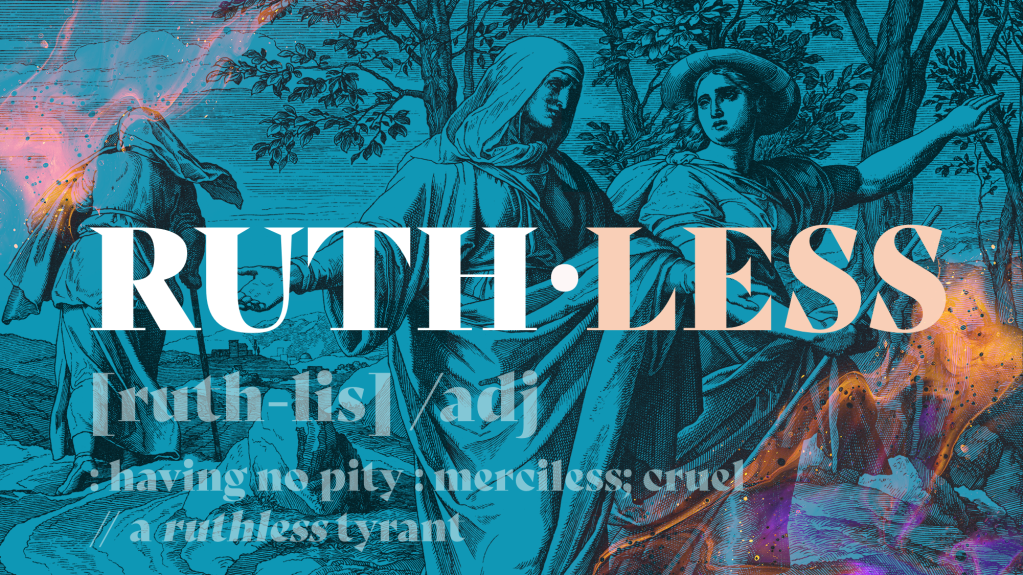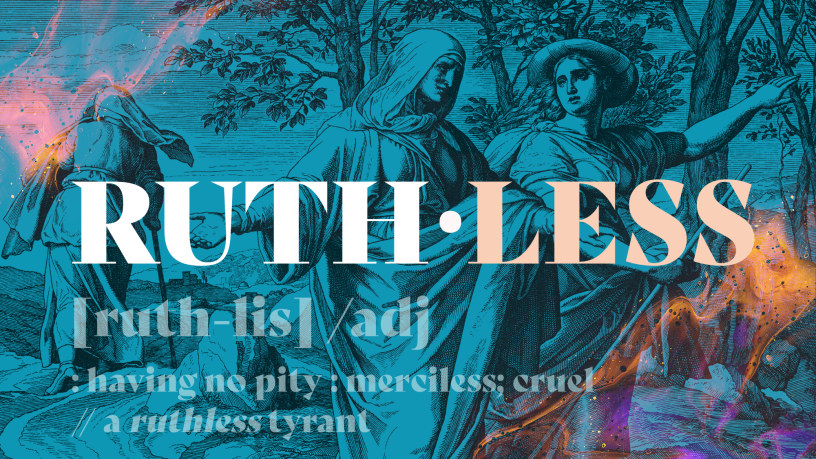
BOTTOM LINE: When affected by a ruthless culture, embrace God’s relentless kindness.
INTRO
Weird WV laws…
- Whistling underwater is prohibited.
- It is illegal to sleep on a train.
- In Huntington – Firemen may not whistle or flirt at any woman passing a firehouse.
- No children may attend school with their breath smelling of “wild onions”
- Roadkill may be taken home for supper.
- It is legal to beat your wife as long as it is done in public on Sunday, on the courthouse steps.
TENSION
Culture is sometimes strange and unfair. Life throws a lot of unfair things at us. How do we respond when things don’t go our way?
What things can go wrong, or be unfair in life?
- Plans fall through
- People make fun of us
- Things/Events get cancelled (D-Now, [Sports, Concerts, Church, etc… thanks COVID] )
- Relationships end
- Mental Health (anxiety, depression, insecurities…)
How do we usually respond?
- We get a bad attitude
- We bargain and reason
- We do not take ownership/responsibility of the situation (“it’s not my fault!”)
- We blame others
- We shut down
What is God’s part in this? How does God respond? What does he think?
When affected by a ruthless culture, embrace God’s relentless kindness.
TRUTH
Scripture: Ruth 1:22-2:23
- Context: Naomi’s husband died, and so did her sons, of whom one was married to Ruth. Ruth stayed with Naomi after being urged to stay in Moab, Ruth’s homeland. Both Ruth and Naomi returned to Bethlehem.
- Background Review: 1 of 2 books named after a woman; themes: redemption, character, and goodness.
Read & Comment:
- Ruth’s Plan (v.2) – go and glean; must find favor (she’s a foreigner!);
- A “Coincidence?” (v.1:22, 2:3-4) – nothing happens by accident in the economy of God
- Boaz Notices (v.5-7)
- “Who does that young woman belong to?” (who does she belong to?)
- Basically meaning, “Check. Her. Out” in original language (Lol).
- v.6 she is a Moabite who came from Moab (emphasised she is not from here).
- He seeks the outcast as his family
- Boaz talks to Ruth (v.8-10) – wealthy israelite landowner is talking to poor moabite woman. This is so counter-cultural.
- v.8-9 Old Testament pickup line?
- Boaz has said “Stay here!! You will be provided for and protected”
- Note: was common for women (especially foreigners) to be abused, mistreated, insulted at the least
- Counter-cultural pt. 2 – Ruth can drink from water filled by men! v.9
- v.10 – “bowed” (worship) – Question of the chapter: “Why have I found such favor in your eyes that you notice me – a foreigner?”
- Boaz response to Ruth (v.12) – rich with imagery
- He shelters the weak under his wings
- Ruth is put at ease (v.13) – Ruth basically says even though I am not one of your servants you have spoken to my heart and soul. Boaz says nothing in return
- Boaz invites Ruth to his table (v.14-18) – in v. 14 this is not just a meal, it is a picture of intimate fellowship at the table. “Offered” means “served” here.
- He serves the hungry at his table.
- v. 15-16 – again, Ruth is provided for and protected by Boaz.
- Boaz provided more than Ruth needed
- He showers the needy with his grace.
- Naomi notices that Ruth has been blessed (v.19-20) –
- Hesed – “kindness”
- Ruth works until the job is done, and she is also protected from harm (v.21-23)
Kindness (v.20): Hebrew word hesed ( חֶסֶד )
Appears 3x in the book of Ruth
- Ruth 1:8
- Ruth 2:20
- Ruth 3:10
TDOT definition: Hesed…
- It always designates not just a human attitude, but also the act that emerges from this attitude.
- It is an act that preserves or promotes life.
- It is intervention on behalf of someone suffering misfortune or distress.
- It is a demonstration of friendship.
- It pursues what is good and not what is evil.
- Can be alternatively translated as: Mercy, kindness, lovingkindness, goodness, kindly, merciful, favour, good, goodliness.
Kindness is…
- An action – kindness is shown to others in time of need.
- Interpersonal – kindness is shown to friends and family (wife/husband, father/son, host/guests, relatives, friends)
- Even in relationships that have developed due to unexpected acts of kindness!
- Enduring – Kindness also endures forever between family members and those who have been shown kindness.
- It is essential to keep this element in relationships in order for them to continue to grow and flourish.
Hesed is on full display in chapter 2.
In Ruth 2, hesed triumphs over 2 ruthless cultural realities:
- Financial & physical abuse
- Insecurity
1. God shows kindness through “chance” events.
Notice v.2 – take initiative despite bad circumstances
- Ruth to Naomi – “Let me go to the fields” v.2
- Ruth makes a move -> God orchestrates.
The “coincidences”
- The barley harvest v.1:22
- Ruth just happened to arrive in Boaz’s field v. 3
- Boaz just happened to come back to Bethlehem v.4
- Ruth just happened to be attractive to Boaz v.5
Could it be that in the middle of our sorrow and suffering, God may just be plotting for our satisfaction?
2. God shows kindness through godly people of character.
- Israel’s “gleaning” method showed kindness to widows, orphans, and immigrants.
- Gleaning was set up by God in Israel to provide for the poor and destitute
- This is contrasted with Moab’s culture (Ruth’s homeland) which had no social support system like this.
- Ruth’s hard work showed kindness to Naomi v.2
- Boaz’s compassion and protection showed kindness to Ruth
- Women were often “assaulted” while gleaning in fields. Boaz confronted the culture by showing kindness to Ruth.
- The character of these people ultimately reveals the character of God to us.
- If we want God to do something with our lives, we should dedicate ourselves to developing godly character.
3. God shows kindness through redeeming pain in hard times.
v.20 The “Guardian Redeemer” (also “Kinsman Redeemer”)
- The Hebrew for “guardian-redeemer” is a legal term for one who has the obligation to redeem a relative in serious difficulty.
- This term especially designates one who delivers or rescues.
- Boaz belonged to the clan of Elimelek (Naomi’s late husband)
Israel’s family flow chart
- Person -> Family -> Clan -> Tribe
- When we experience hard times, we can look to God’s enduring kindness (remember hesed ) that restores us, picks us up when we have fallen, and brings us back to the love of the father.
- God ordains tragedy to set the stage for triumph.
- God’s kindness toward us goes perfectly with the familial aspect of hesed, reflecting on the relationship between father and children, and husband and wife (Groom – Jesus, Bride – the church).
APPLICATION
#1 – Refuge: Take refuge under God’s care (see v.12).
#2 – Rely: Rely on God’s promises that he gives us in scripture.
#3 – Remember: Remember God’s kindness to us even when we cannot see it.
